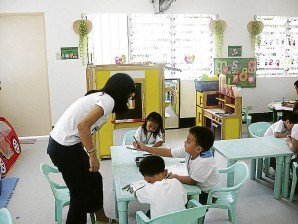Good quality education for only P50
Compared with the impressive facades of the Br. Andrew Gonzalez Hall and the Enrique Razon Sports Center, another school building of De La Salle University (DLSU) on Taft Avenue, Manila, is hardly noticeable when one views the campus from a Light Rail Transit train.
The size of the one-story structure, however, belies the big role it plays in the lives of children of preschool age from poor families along Leveriza Street and neighboring areas.
“We’re making a difference in the life of the kids and their families by providing them quality education,” Maria Fe Ferrer, the coordinator of the preschool, told the Philippine Daily Inquirer.
The school charges its students P50 each for the whole school year. The amount covers instructional materials, the school uniform and field trip expenses.
“It is a contribution of sorts to make the parents feel that it is not a dole-out. It’s our way of letting them know that they have responsibilities [when it comes to] their children,” Ferrer said.
Article continues after this advertisementThe parents also serve as the school’s partners in maintaining the building’s cleanliness and organizing and looking for venues for activities like Christmas programs and Family Day.
Article continues after this advertisement“We talk to the parents all the time. We go to their place or they come here. And they are happy to discover that their children are well taken care of. It feels great because we see that they also learn along with their children,” said the early childhood education major who has been teaching at La Salle for nine years.
She added that in a community where everybody knows everyone, it was easy to find out that most of the students’ parents did not finish high school and even fewer reached first year college.
None of the children, however, belong to broken homes or live in the streets. Their fathers work as pedicab drivers, construction workers, security guards or vendors although in some cases, the women are the breadwinners.
“We look at the salaries and the size of the family before we consider them for the program. We tell them: ‘You’re not qualified because your husband’s salary is more than enough.’ And they answer back: ‘But, teacher, we have seven children.’ If you ask for their backgrounds, your findings give you a better understanding [of them],” she said.
St. La Salle Preschool is the brainchild of the late president of De La Salle, Br. Andrew Gonzalez FSC, who saw it as the school’s way of giving back to the community.
The nonprofit school was established under the university’s College of Education in 1999 right in the heart of the depressed community of Leveriza. In 2008, it moved to its present location on Fidel Reyes Street.
Ferrer, who helps in the planning and coordinates with De La Salle administration, said they strictly observe the 15 pupils-per-class policy. There are four sections—two each for kindergarten and preparatory.
“We’re not going to cram them inside a room so they will be able to study well,” she said, adding that the two teachers who conduct the morning and afternoon classes are assisted by volunteers who are taking up education at DLSU.
“We tell them to be diligent with their studies so they can study in ‘big La Salle.’ They call their school ‘small La Salle,’” Ferrer said with a laugh.
According to her, they use Filipino as the medium of instruction since it is the language their students speak in their homes.
“If you read to them in English, they would call our attention: ‘Teacher, more in Tagalog, please.’ They read very well in Filipino,” Ferrer added.
The children’s sense of identity as Filipinos is not only reflected in their choice of Filipino as a language of preference, Ferrer said, but what they are as individuals is what they actually give.
“We asked them one time to name some Filipinos they know. And they singled out the members of their families. The common Filipino according to them is moreno (deep brown) with black hair,” Ferrer said.
Ferrer noted that the children especially the preps were also aware of the elections last year and they know that Benigno S. Aquino III is the new president.
“We integrate reading with writing and part of the writing exercises is a collective letter they wrote for the President which the teacher helped in composing,” she said showing the manila paper that contains the letter in Filipino.
“Dear President Noynoy Aquino, take care of the people. Don’t abandon the people. Safeguard the people. If there’s fire, please let the people ride in your jeepney (car) … Please repair the roads so the people won’t stumble. Come to our school so we can shake hands with you,” part of the letter says.
The parents’ involvement, Ferrer said, is very important in the mental and physical development of the child. These children are the mirror of their environment at home.
“We have a child who was very rowdy at the beginning of the school year. We found out that the parents are having problems. He would tell us: ‘Teacher, my mother left our house because she had quarrel with my father,”’ Ferrer said.
Ferrer said that if the parents are not supportive, the children won’t be encouraged to go to school. If a child has already incurred 40 absences, he is considered dropped out.
“One child once said: ‘I don’t like to be here in school anymore. I am always pressured to think. I’m getting tired,”’ she recalls, adding that one parent underestimated the power of child learning by commenting “that’s only preschool!”
But school teachers of the nearby Aurora A. Quezon Elementary School, a public school on San Andres Street, in Malate, are excited to admit them to Grade 1, with one general expression: “Oh, they’re all good!” Ferrer said.
